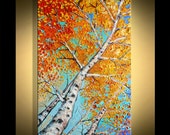The Time Machine
None
The Time Traveller (for so it will be convenient to speak of him) was expounding a recondite matter to us. His grey eyes shone and twinkled, and his usually pale face was flushed and animated. The fire burned brightly, and the soft radiance of the incandescent lights in the lilies of silver caught the bubbles that flashed and passed in our glasses. Our chairs, being his patents, embraced and caressed us rather than submitted to be sat upon, and there was that luxurious after-dinner atmosphere when thought roams gracefully free of the trammels of precision. And he put it to us in this way—marking the points with a lean forefinger—as we sat and lazily admired his earnestness over this new paradox (as we thought it) and his fecundity.



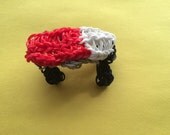
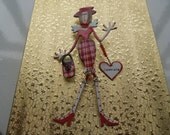

'Is not that rather a large thing to expect us to begin upon?' said Filby, an argumentative person with red hair.



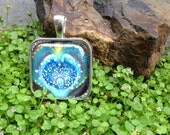


'You can show black is white by argument,' said Filby, 'but you will never convince me.'



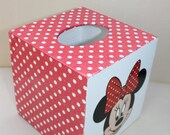


The thing the Time Traveller held in his hand was a glittering metallic framework, scarcely larger than a small clock, and very delicately made. There was ivory in it, and some transparent crystalline substance. And now I must be explicit, for this that follows—unless his explanation is to be accepted—is an absolutely unaccountable thing. He took one of the small octagonal tables that were scattered about the room, and set it in front of the fire, with two legs on the hearthrug. On this table he placed the mechanism. Then he drew up a chair, and sat down. The only other object on the table was a small shaded lamp, the bright light of which fell upon the model. There were also perhaps a dozen candles about, two in brass candlesticks upon the mantel and several in sconces, so that the room was brilliantly illuminated. I sat in a low arm-chair nearest the fire, and I drew this forward so as to be almost between the Time Traveller and the fireplace. Filby sat behind him, looking over his shoulder. The Medical Man and the Provincial Mayor watched him in profile from the right, the Psychologist from the left. The Very Young Man stood behind the Psychologist. We were all on the alert. It appears incredible to me that any kind of trick, however subtly conceived and however adroitly done, could have been played upon us under these conditions.






'This little affair,' said the Time Traveller, resting his elbows upon the table and pressing his hands together above the apparatus, 'is only a model. It is my plan for a machine to travel through time. You will notice that it looks singularly askew, and that there is an odd twinkling appearance about this bar, as though it was in some way unreal.' He pointed to the part with his finger. 'Also, here is one little white lever, and here is another.'



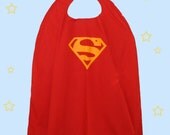
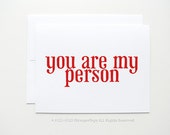

There was a minute's pause perhaps. The Psychologist seemed about to speak to me, but changed his mind. Then the Time Traveller put forth his finger towards the lever. 'No,' he said suddenly. 'Lend me your hand.' And turning to the Psychologist, he took that individual's hand in his own and told him to put out his forefinger. So that it was the Psychologist himself who sent forth the model Time Machine on its interminable voyage. We all saw the lever turn. I am absolutely certain there was no trickery. There was a breath of wind, and the lamp flame jumped. One of the candles on the mantel was blown out, and the little machine suddenly swung round, became indistinct, was seen as a ghost for a second perhaps, as an eddy of faintly glittering brass and ivory; and it was gone—vanished! Save for the lamp the table was bare.



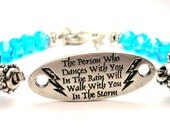


He was in an amazing plight. His coat was dusty and dirty, and smeared with green down the sleeves; his hair disordered, and as it seemed to me greyer—either with dust and dirt or because its colour had actually faded. His face was ghastly pale; his chin had a brown cut on it—a cut half healed; his expression was haggard and drawn, as by intense suffering. For a moment he hesitated in the doorway, as if he had been dazzled by the light. Then he came into the room. He walked with just such a limp as I have seen in footsore tramps. We stared at him in silence, expecting him to speak.






'Agreed,' said the Editor, and the rest of us echoed 'Agreed.' And with that the Time Traveller began his story as I have set it forth. He sat back in his chair at first, and spoke like a weary man. Afterwards he got more animated. In writing it down I feel with only too much keenness the inadequacy of pen and ink—and, above all, my own inadequacy—to express its quality. You read, I will suppose, attentively enough; but you cannot see the speaker's white, sincere face in the bright circle of the little lamp, nor hear the intonation of his voice. You cannot know how his expression followed the turns of his story! Most of us hearers were in shadow, for the candles in the smoking-room had not been lighted, and only the face of the Journalist and the legs of the Silent Man from the knees downward were illuminated. At first we glanced now and again at each other. After a time we ceased to do that, and looked only at the Time Traveller's face.




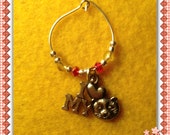

'I told some of you last Thursday of the principles of the Time Machine, and showed you the actual thing itself, incomplete in the workshop. There it is now, a little travel-worn, truly; and one of the ivory bars is cracked, and a brass rail bent; but the rest of it's sound enough. I expected to finish it on Friday, but on Friday, when the putting together was nearly done, I found that one of the nickel bars was exactly one inch too short, and this I had to get remade; so that the thing was not complete until this morning. It was at ten o'clock to-day that the first of all Time Machines began its career. I gave it a last tap, tried all the screws again, put one more drop of oil on the quartz rod, and sat myself in the saddle. I suppose a suicide who holds a pistol to his skull feels much the same wonder at what will come next as I felt then. I took the starting lever in one hand and the stopping one in the other, pressed the first, and almost immediately the second. I seemed to reel; I felt a nightmare sensation of falling; and, looking round, I saw the laboratory exactly as before. Had anything happened? For a moment I suspected that my intellect had tricked me. Then I noted the clock. A moment before, as it seemed, it had stood at a minute or so past ten; now it was nearly half-past three!






'I drew a breath, set my teeth, gripped the starting lever with both hands, and went off with a thud. The laboratory got hazy and went dark. Mrs. Watchett came in and walked, apparently without seeing me, towards the garden door. I suppose it took her a minute or so to traverse the place, but to me she seemed to shoot across the room like a rocket. I pressed the lever over to its extreme position. The night came like the turning out of a lamp, and in another moment came to-morrow. The laboratory grew faint and hazy, then fainter and ever fainter. To-morrow night came black, then day again, night again, day again, faster and faster still. An eddying murmur filled my ears, and a strange, dumb confusedness descended on my mind.






'I am afraid I cannot convey the peculiar sensations of time travelling. They are excessively unpleasant. There is a feeling exactly like that one has upon a switchback—of a helpless headlong motion! I felt the same horrible anticipation, too, of an imminent smash. As I put on pace, night followed day like the flapping of a black wing. The dim suggestion of the laboratory seemed presently to fall away from me, and I saw the sun hopping swiftly across the sky, leaping it every minute, and every minute marking a day. I supposed the laboratory had been destroyed and I had come into the open air. I had a dim impression of scaffolding, but I was already going too fast to be conscious of any moving things. The slowest snail that ever crawled dashed by too fast for me. The twinkling succession of darkness and light was excessively painful to the eye. Then, in the intermittent darknesses, I saw the moon spinning swiftly through her quarters from new to full, and had a faint glimpse of the circling stars. Presently, as I went on, still gaining velocity, the palpitation of night and day merged into one continuous greyness; the sky took on a wonderful deepness of blue, a splendid luminous color like that of early twilight; the jerking sun became a streak of fire, a brilliant arch, in space; the moon a fainter fluctuating band; and I could see nothing of the stars, save now and then a brighter circle flickering in the blue.




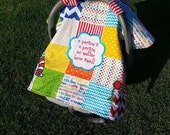

'The landscape was misty and vague. I was still on the hill-side upon which this house now stands, and the shoulder rose above me grey and dim. I saw trees growing and changing like puffs of vapour, now brown, now green; they grew, spread, shivered, and passed away. I saw huge buildings rise up faint and fair, and pass like dreams. The whole surface of the earth seemed changed—melting and flowing under my eyes. The little hands upon the dials that registered my speed raced round faster and faster. Presently I noted that the sun belt swayed up and down, from solstice to solstice, in a minute or less, and that consequently my pace was over a year a minute; and minute by minute the white snow flashed across the world, and vanished, and was followed by the bright, brief green of spring.






'The unpleasant sensations of the start were less poignant now. They merged at last into a kind of hysterical exhilaration. I remarked indeed a clumsy swaying of the machine, for which I was unable to account. But my mind was too confused to attend to it, so with a kind of madness growing upon me, I flung myself into futurity. At first I scarce thought of stopping, scarce thought of anything but these new sensations. But presently a fresh series of impressions grew up in my mind—a certain curiosity and therewith a certain dread—until at last they took complete possession of me. What strange developments of humanity, what wonderful advances upon our rudimentary civilization, I thought, might not appear when I came to look nearly into the dim elusive world that raced and fluctuated before my eyes! I saw great and splendid architecture rising about me, more massive than any buildings of our own time, and yet, as it seemed, built of glimmer and mist. I saw a richer green flow up the hill-side, and remain there, without any wintry intermission. Even through the veil of my confusion the earth seemed very fair. And so my mind came round to the business of stopping.



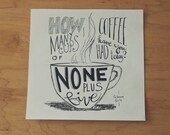
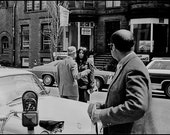

'There was the sound of a clap of thunder in my ears. I may have been stunned for a moment. A pitiless hail was hissing round me, and I was sitting on soft turf in front of the overset machine. Everything still seemed grey, but presently I remarked that the confusion in my ears was gone. I looked round me. I was on what seemed to be a little lawn in a garden, surrounded by rhododendron bushes, and I noticed that their mauve and purple blossoms were dropping in a shower under the beating of the hail-stones. The rebounding, dancing hail hung in a cloud over the machine, and drove along the ground like smoke. In a moment I was wet to the skin. "Fine hospitality," said I, "to a man who has travelled innumerable years to see you."



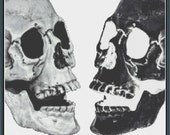
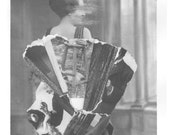

'Presently I thought what a fool I was to get wet. I stood up and looked round me. A colossal figure, carved apparently in some white stone, loomed indistinctly beyond the rhododendrons through the hazy downpour. But all else of the world was invisible.



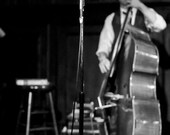
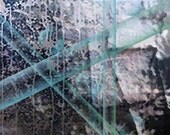

'My sensations would be hard to describe. As the columns of hail grew thinner, I saw the white figure more distinctly. It was very large, for a silver birch-tree touched its shoulder. It was of white marble, in shape something like a winged sphinx, but the wings, instead of being carried vertically at the sides, were spread so that it seemed to hover. The pedestal, it appeared to me, was of bronze, and was thick with verdigris. It chanced that the face was towards me; the sightless eyes seemed to watch me; there was the faint shadow of a smile on the lips. It was greatly weather-worn, and that imparted an unpleasant suggestion of disease. I stood looking at it for a little space—half a minute, perhaps, or half an hour. It seemed to advance and to recede as the hail drove before it denser or thinner. At last I tore my eyes from it for a moment and saw that the hail curtain had worn threadbare, and that the sky was lightening with the promise of the sun.



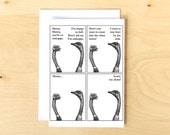


'I looked up again at the crouching white shape, and the full temerity of my voyage came suddenly upon me. What might appear when that hazy curtain was altogether withdrawn? What might not have happened to men? What if cruelty had grown into a common passion? What if in this interval the race had lost its manliness and had developed into something inhuman, unsympathetic, and overwhelmingly powerful? I might seem some old-world savage animal, only the more dreadful and disgusting for our common likeness—a foul creature to be incontinently slain.




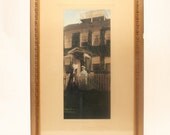

'Already I saw other vast shapes—huge buildings with intricate parapets and tall columns, with a wooded hill-side dimly creeping in upon me through the lessening storm. I was seized with a panic fear. I turned frantically to the Time Machine, and strove hard to readjust it. As I did so the shafts of the sun smote through the thunderstorm. The grey downpour was swept aside and vanished like the trailing garments of a ghost. Above me, in the intense blue of the summer sky, some faint brown shreds of cloud whirled into nothingness. The great buildings about me stood out clear and distinct, shining with the wet of the thunderstorm, and picked out in white by the unmelted hailstones piled along their courses. I felt naked in a strange world. I felt as perhaps a bird may feel in the clear air, knowing the hawk wings above and will swoop. My fear grew to frenzy. I took a breathing space, set my teeth, and again grappled fiercely, wrist and knee, with the machine. It gave under my desperate onset and turned over. It struck my chin violently. One hand on the saddle, the other on the lever, I stood panting heavily in attitude to mount again.



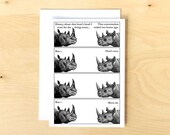
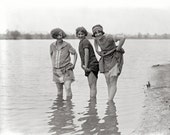

'Then I heard voices approaching me. Coming through the bushes by the White Sphinx were the heads and shoulders of men running. One of these emerged in a pathway leading straight to the little lawn upon which I stood with my machine. He was a slight creature—perhaps four feet high—clad in a purple tunic, girdled at the waist with a leather belt. Sandals or buskins—I could not clearly distinguish which—were on his feet; his legs were bare to the knees, and his head was bare. Noticing that, I noticed for the first time how warm the air was.



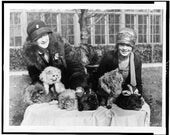


'There were others coming, and presently a little group of perhaps eight or ten of these exquisite creatures were about me. One of them addressed me. It came into my head, oddly enough, that my voice was too harsh and deep for them. So I shook my head, and, pointing to my ears, shook it again. He came a step forward, hesitated, and then touched my hand. Then I felt other soft little tentacles upon my back and shoulders. They wanted to make sure I was real. There was nothing in this at all alarming. Indeed, there was something in these pretty little people that inspired confidence—a graceful gentleness, a certain childlike ease. And besides, they looked so frail that I could fancy myself flinging the whole dozen of them about like nine-pins. But I made a sudden motion to warn them when I saw their little pink hands feeling at the Time Machine. Happily then, when it was not too late, I thought of a danger I had hitherto forgotten, and reaching over the bars of the machine I unscrewed the little levers that would set it in motion, and put these in my pocket. Then I turned again to see what I could do in the way of communication.




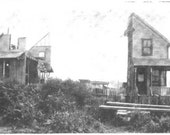

'And then, looking more nearly into their features, I saw some further peculiarities in their Dresden-china type of prettiness. Their hair, which was uniformly curly, came to a sharp end at the neck and cheek; there was not the faintest suggestion of it on the face, and their ears were singularly minute. The mouths were small, with bright red, rather thin lips, and the little chins ran to a point. The eyes were large and mild; and—this may seem egotism on my part—I fancied even that there was a certain lack of the interest I might have expected in them.



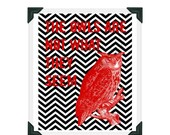
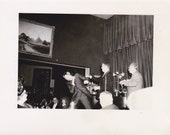

'As they made no effort to communicate with me, but simply stood round me smiling and speaking in soft cooing notes to each other, I began the conversation. I pointed to the Time Machine and to myself. Then hesitating for a moment how to express time, I pointed to the sun. At once a quaintly pretty little figure in chequered purple and white followed my gesture, and then astonished me by imitating the sound of thunder.




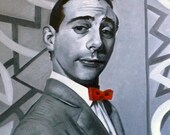

'I nodded, pointed to the sun, and gave them such a vivid rendering of a thunderclap as startled them. They all withdrew a pace or so and bowed. Then came one laughing towards me, carrying a chain of beautiful flowers altogether new to me, and put it about my neck. The idea was received with melodious applause; and presently they were all running to and fro for flowers, and laughingly flinging them upon me until I was almost smothered with blossom. You who have never seen the like can scarcely imagine what delicate and wonderful flowers countless years of culture had created. Then someone suggested that their plaything should be exhibited in the nearest building, and so I was led past the sphinx of white marble, which had seemed to watch me all the while with a smile at my astonishment, towards a vast grey edifice of fretted stone. As I went with them the memory of my confident anticipations of a profoundly grave and intellectual posterity came, with irresistible merriment, to my mind.






'The building had a huge entry, and was altogether of colossal dimensions. I was naturally most occupied with the growing crowd of little people, and with the big open portals that yawned before me shadowy and mysterious. My general impression of the world I saw over their heads was a tangled waste of beautiful bushes and flowers, a long neglected and yet weedless garden. I saw a number of tall spikes of strange white flowers, measuring a foot perhaps across the spread of the waxen petals. They grew scattered, as if wild, among the variegated shrubs, but, as I say, I did not examine them closely at this time. The Time Machine was left deserted on the turf among the rhododendrons.






'The arch of the doorway was richly carved, but naturally I did not observe the carving very narrowly, though I fancied I saw suggestions of old Phoenician decorations as I passed through, and it struck me that they were very badly broken and weather-worn. Several more brightly clad people met me in the doorway, and so we entered, I, dressed in dingy nineteenth-century garments, looking grotesque enough, garlanded with flowers, and surrounded by an eddying mass of bright, soft-colored robes and shining white limbs, in a melodious whirl of laughter and laughing speech.




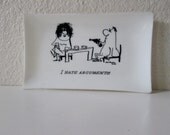

'The big doorway opened into a proportionately great hall hung with brown. The roof was in shadow, and the windows, partially glazed with coloured glass and partially unglazed, admitted a tempered light. The floor was made up of huge blocks of some very hard white metal, not plates nor slabs—blocks, and it was so much worn, as I judged by the going to and fro of past generations, as to be deeply channelled along the more frequented ways. Transverse to the length were innumerable tables made of slabs of polished stone, raised perhaps a foot from the floor, and upon these were heaps of fruits. Some I recognized as a kind of hypertrophied raspberry and orange, but for the most part they were strange.






'There I found a seat of some yellow metal that I did not recognize, corroded in places with a kind of pinkish rust and half smothered in soft moss, the arm-rests cast and filed into the resemblance of griffins' heads. I sat down on it, and I surveyed the broad view of our old world under the sunset of that long day. It was as sweet and fair a view as I have ever seen. The sun had already gone below the horizon and the west was flaming gold, touched with some horizontal bars of purple and crimson. Below was the valley of the Thames, in which the river lay like a band of burnished steel. I have already spoken of the great palaces dotted about among the variegated greenery, some in ruins and some still occupied. Here and there rose a white or silvery figure in the waste garden of the earth, here and there came the sharp vertical line of some cupola or obelisk. There were no hedges, no signs of proprietary rights, no evidences of agriculture; the whole earth had become a garden.






'After all, the sanitation and the agriculture of to-day are still in the rudimentary stage. The science of our time has attacked but a little department of the field of human disease, but even so, it spreads its operations very steadily and persistently. Our agriculture and horticulture destroy a weed just here and there and cultivate perhaps a score or so of wholesome plants, leaving the greater number to fight out a balance as they can. We improve our favourite plants and animals—and how few they are—gradually by selective breeding; now a new and better peach, now a seedless grape, now a sweeter and larger flower, now a more convenient breed of cattle. We improve them gradually, because our ideals are vague and tentative, and our knowledge is very limited; because Nature, too, is shy and slow in our clumsy hands. Some day all this will be better organized, and still better. That is the drift of the current in spite of the eddies. The whole world will be intelligent, educated, and co-operating; things will move faster and faster towards the subjugation of Nature. In the end, wisely and carefully we shall readjust the balance of animal and vegetable life to suit our human needs.



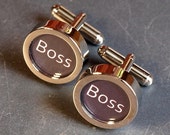


'As I stood there musing over this too perfect triumph of man, the full moon, yellow and gibbous, came up out of an overflow of silver light in the north-east. The bright little figures ceased to move about below, a noiseless owl flitted by, and I shivered with the chill of the night. I determined to descend and find where I could sleep.






'I looked for the building I knew. Then my eye travelled along to the figure of the White Sphinx upon the pedestal of bronze, growing distinct as the light of the rising moon grew brighter. I could see the silver birch against it. There was the tangle of rhododendron bushes, black in the pale light, and there was the little lawn. I looked at the lawn again. A queer doubt chilled my complacency. "No," said I stoutly to myself, "that was not the lawn."






'But itwasthe lawn. For the white leprous face of the sphinx was towards it. Can you imagine what I felt as this conviction came home to me? But you cannot. The Time Machine was gone!



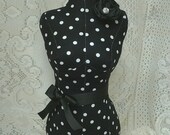


'When I reached the lawn my worst fears were realized. Not a trace of the thing was to be seen. I felt faint and cold when I faced the empty space among the black tangle of bushes. I ran round it furiously, as if the thing might be hidden in a corner, and then stopped abruptly, with my hands clutching my hair. Above me towered the sphinx, upon the bronze pedestal, white, shining, leprous, in the light of the rising moon. It seemed to smile in mockery of my dismay.






'I think I must have had a kind of frenzy. I remember running violently in and out among the moonlit bushes all round the sphinx, and startling some white animal that, in the dim light, I took for a small deer. I remember, too, late that night, beating the bushes with my clenched fist until my knuckles were gashed and bleeding from the broken twigs. Then, sobbing and raving in my anguish of mind, I went down to the great building of stone. The big hall was dark, silent, and deserted. I slipped on the uneven floor, and fell over one of the malachite tables, almost breaking my shin. I lit a match and went on past the dusty curtains, of which I have told you.



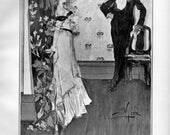


'Abruptly, I dashed down the match, and, knocking one of the people over in my course, went blundering across the big dining-hall again, out under the moonlight. I heard cries of terror and their little feet running and stumbling this way and that. I do not remember all I did as the moon crept up the sky. I suppose it was the unexpected nature of my loss that maddened me. I felt hopelessly cut off from my own kind—a strange animal in an unknown world. I must have raved to and fro, screaming and crying upon God and Fate. I have a memory of horrible fatigue, as the long night of despair wore away; of looking in this impossible place and that; of groping among moon-lit ruins and touching strange creatures in the black shadows; at last, of lying on the ground near the sphinx and weeping with absolute wretchedness. I had nothing left but misery. Then I slept, and when I woke again it was full day, and a couple of sparrows were hopping round me on the turf within reach of my arm.






'I saw the heads of two orange-clad people coming through the bushes and under some blossom-covered apple-trees towards me. I turned smiling to them and beckoned them to me. They came, and then, pointing to the bronze pedestal, I tried to intimate my wish to open it. But at my first gesture towards this they behaved very oddly. I don't know how to convey their expression to you. Suppose you were to use a grossly improper gesture to a delicate-minded woman—it is how she would look. They went off as if they had received the last possible insult. I tried a sweet-looking little chap in white next, with exactly the same result. Somehow, his manner made me feel ashamed of myself. But, as you know, I wanted the Time Machine, and I tried him once more. As he turned off, like the others, my temper got the better of me. In three strides I was after him, had him by the loose part of his robe round the neck, and began dragging him towards the sphinx. Then I saw the horror and repugnance of his face, and all of a sudden I let him go.






'So far as I could see, all the world displayed the same exuberant richness as the Thames valley. From every hill I climbed I saw the same abundance of splendid buildings, endlessly varied in material and style, the same clustering thickets of evergreens, the same blossom-laden trees and tree-ferns. Here and there water shone like silver, and beyond, the land rose into blue undulating hills, and so faded into the serenity of the sky. A peculiar feature, which presently attracted my attention, was the presence of certain circular wells, several, as it seemed to me, of a very great depth. One lay by the path up the hill, which I had followed during my first walk. Like the others, it was rimmed with bronze, curiously wrought, and protected by a little cupola from the rain. Sitting by the side of these wells, and peering down into the shafted darkness, I could see no gleam of water, nor could I start any reflection with a lighted match. But in all of them I heard a certain sound: a thud—thud—thud, like the beating of some big engine; and I discovered, from the flaring of my matches, that a steady current of air set down the shafts. Further, I threw a scrap of paper into the throat of one, and, instead of fluttering slowly down, it was at once sucked swiftly out of sight.






'And here I must admit that I learned very little of drains and bells and modes of conveyance, and the like conveniences, during my time in this real future. In some of these visions of Utopias and coming times which I have read, there is a vast amount of detail about building, and social arrangements, and so forth. But while such details are easy enough to obtain when the whole world is contained in one's imagination, they are altogether inaccessible to a real traveller amid such realities as I found here. Conceive the tale of London which a negro, fresh from Central Africa, would take back to his tribe! What would he know of railway companies, of social movements, of telephone and telegraph wires, of the Parcels Delivery Company, and postal orders and the like? Yet we, at least, should be willing enough to explain these things to him! And even of what he knew, how much could he make his untravelled friend either apprehend or believe? Then, think how narrow the gap between a negro and a white man of our own times, and how wide the interval between myself and these of the Golden Age! I was sensible of much which was unseen, and which contributed to my comfort; but save for a general impression of automatic organization, I fear I can convey very little of the difference to your mind.




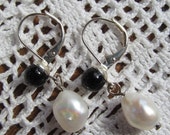

'Then, again, about the Time Machine: something, I knew not what, had taken it into the hollow pedestal of the White Sphinx. Why? For the life of me I could not imagine. Those waterless wells, too, those flickering pillars. I felt I lacked a clue. I felt—how shall I put it? Suppose you found an inscription, with sentences here and there in excellent plain English, and interpolated therewith, others made up of words, of letters even, absolutely unknown to you? Well, on the third day of my visit, that was how the world of Eight Hundred and Two Thousand Seven Hundred and One presented itself to me!



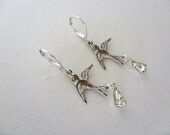


'She was exactly like a child. She wanted to be with me always. She tried to follow me everywhere, and on my next journey out and about it went to my heart to tire her down, and leave her at last, exhausted and calling after me rather plaintively. But the problems of the world had to be mastered. I had not, I said to myself, come into the future to carry on a miniature flirtation. Yet her distress when I left her was very great, her expostulations at the parting were sometimes frantic, and I think, altogether, I had as much trouble as comfort from her devotion. Nevertheless she was, somehow, a very great comfort. I thought it was mere childish affection that made her cling to me. Until it was too late, I did not clearly know what I had inflicted upon her when I left her. Nor until it was too late did I clearly understand what she was to me. For, by merely seeming fond of me, and showing in her weak, futile way that she cared for me, the little doll of a creature presently gave my return to the neighbourhood of the White Sphinx almost the feeling of coming home; and I would watch for her tiny figure of white and gold so soon as I came over the hill.






'It was from her, too, that I learned that fear had not yet left the world. She was fearless enough in the daylight, and she had the oddest confidence in me; for once, in a foolish moment, I made threatening grimaces at her, and she simply laughed at them. But she dreaded the dark, dreaded shadows, dreaded black things. Darkness to her was the one thing dreadful. It was a singularly passionate emotion, and it set me thinking and observing. I discovered then, among other things, that these little people gathered into the great houses after dark, and slept in droves. To enter upon them without a light was to put them into a tumult of apprehension. I never found one out of doors, or one sleeping alone within doors, after dark. Yet I was still such a blockhead that I missed the lesson of that fear, and in spite of Weena's distress I insisted upon sleeping away from these slumbering multitudes.



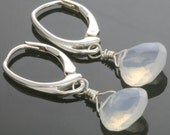


'The moon was setting, and the dying moonlight and the first pallor of dawn were mingled in a ghastly half-light. The bushes were inky black, the ground a sombre grey, the sky colourless and cheerless. And up the hill I thought I could see ghosts. There several times, as I scanned the slope, I saw white figures. Twice I fancied I saw a solitary white, ape-like creature running rather quickly up the hill, and once near the ruins I saw a leash of them carrying some dark body. They moved hastily. I did not see what became of them. It seemed that they vanished among the bushes. The dawn was still indistinct, you must understand. I was feeling that chill, uncertain, early-morning feeling you may have known. I doubted my eyes.



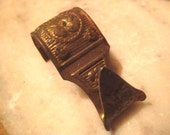
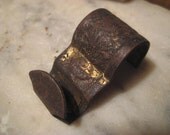

'As the eastern sky grew brighter, and the light of the day came on and its vivid colouring returned upon the world once more, I scanned the view keenly. But I saw no vestige of my white figures. They were mere creatures of the half light. "They must have been ghosts," I said; "I wonder whence they dated." For a queer notion of Grant Allen's came into my head, and amused me. If each generation die and leave ghosts, he argued, the world at last will get overcrowded with them. On that theory they would have grown innumerable some Eight Hundred Thousand Years hence, and it was no great wonder to see four at once. But the jest was unsatisfying, and I was thinking of these figures all the morning, until Weena's rescue drove them out of my head. I associated them in some indefinite way with the white animal I had startled in my first passionate search for the Time Machine. But Weena was a pleasant substitute. Yet all the same, they were soon destined to take far deadlier possession of my mind.



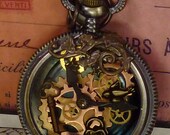
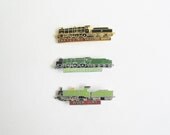

'The old instinctive dread of wild beasts came upon me. I clenched my hands and steadfastly looked into the glaring eyeballs. I was afraid to turn. Then the thought of the absolute security in which humanity appeared to be living came to my mind. And then I remembered that strange terror of the dark. Overcoming my fear to some extent, I advanced a step and spoke. I will admit that my voice was harsh and ill-controlled. I put out my hand and touched something soft. At once the eyes darted sideways, and something white ran past me. I turned with my heart in my mouth, and saw a queer little ape-like figure, its head held down in a peculiar manner, running across the sunlit space behind me. It blundered against a block of granite, staggered aside, and in a moment was hidden in a black shadow beneath another pile of ruined masonry.



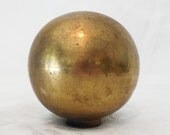
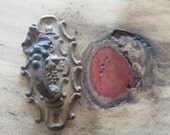

'My impression of it is, of course, imperfect; but I know it was a dull white, and had strange large greyish-red eyes; also that there was flaxen hair on its head and down its back. But, as I say, it went too fast for me to see distinctly. I cannot even say whether it ran on all-fours, or only with its forearms held very low. After an instant's pause I followed it into the second heap of ruins. I could not find it at first; but, after a time in the profound obscurity, I came upon one of those round well-like openings of which I have told you, half closed by a fallen pillar. A sudden thought came to me. Could this Thing have vanished down the shaft? I lit a match, and, looking down, I saw a small, white, moving creature, with large bright eyes which regarded me steadfastly as it retreated. It made me shudder. It was so like a human spider! It was clambering down the wall, and now I saw for the first time a number of metal foot and hand rests forming a kind of ladder down the shaft. Then the light burned my fingers and fell out of my hand, going out as it dropped, and when I had lit another the little monster had disappeared.



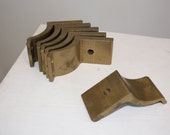


'Here was the new view. Plainly, this second species of Man was subterranean. There were three circumstances in particular which made me think that its rare emergence above ground was the outcome of a long-continued underground habit. In the first place, there was the bleached look common in most animals that live largely in the dark—the white fish of the Kentucky caves, for instance. Then, those large eyes, with that capacity for reflecting light, are common features of nocturnal things—witness the owl and the cat. And last of all, that evident confusion in the sunshine, that hasty yet fumbling awkward flight towards dark shadow, and that peculiar carriage of the head while in the light—all reinforced the theory of an extreme sensitiveness of the retina.



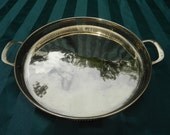
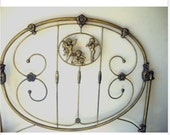

'At first, proceeding from the problems of our own age, it seemed clear as daylight to me that the gradual widening of the present merely temporary and social difference between the Capitalist and the Labourer, was the key to the whole position. No doubt it will seem grotesque enough to you—and wildly incredible!—and yet even now there are existing circumstances to point that way. There is a tendency to utilize underground space for the less ornamental purposes of civilization; there is the Metropolitan Railway in London, for instance, there are new electric railways, there are subways, there are underground workrooms and restaurants, and they increase and multiply. Evidently, I thought, this tendency had increased till Industry had gradually lost its birthright in the sky. I mean that it had gone deeper and deeper into larger and ever larger underground factories, spending a still-increasing amount of its time therein, till, in the end—! Even now, does not an East-end worker live in such artificial conditions as practically to be cut off from the natural surface of the earth?






'It was this restlessness, this insecurity, perhaps, that drove me further and further afield in my exploring expeditions. Going to the south-westward towards the rising country that is now called Combe Wood, I observed far off, in the direction of nineteenth-century Banstead, a vast green structure, different in character from any I had hitherto seen. It was larger than the largest of the palaces or ruins I knew, and the facade had an Oriental look: the face of it having the lustre, as well as the pale-green tint, a kind of bluish-green, of a certain type of Chinese porcelain. This difference in aspect suggested a difference in use, and I was minded to push on and explore. But the day was growing late, and I had come upon the sight of the place after a long and tiring circuit; so I resolved to hold over the adventure for the following day, and I returned to the welcome and the caresses of little Weena. But next morning I perceived clearly enough that my curiosity regarding the Palace of Green Porcelain was a piece of self-deception, to enable me to shirk, by another day, an experience I dreaded. I resolved I would make the descent without further waste of time, and started out in the early morning towards a well near the ruins of granite and aluminium.




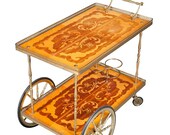

'I had to clamber down a shaft of perhaps two hundred yards. The descent was effected by means of metallic bars projecting from the sides of the well, and these being adapted to the needs of a creature much smaller and lighter than myself, I was speedily cramped and fatigued by the descent. And not simply fatigued! One of the bars bent suddenly under my weight, and almost swung me off into the blackness beneath. For a moment I hung by one hand, and after that experience I did not dare to rest again. Though my arms and back were presently acutely painful, I went on clambering down the sheer descent with as quick a motion as possible. Glancing upward, I saw the aperture, a small blue disk, in which a star was visible, while little Weena's head showed as a round black projection. The thudding sound of a machine below grew louder and more oppressive. Everything save that little disk above was profoundly dark, and when I looked up again Weena had disappeared.






'I do not know how long I lay. I was roused by a soft hand touching my face. Starting up in the darkness I snatched at my matches and, hastily striking one, I saw three stooping white creatures similar to the one I had seen above ground in the ruin, hastily retreating before the light. Living, as they did, in what appeared to me impenetrable darkness, their eyes were abnormally large and sensitive, just as are the pupils of the abysmal fishes, and they reflected the light in the same way. I have no doubt they could see me in that rayless obscurity, and they did not seem to have any fear of me apart from the light. But, so soon as I struck a match in order to see them, they fled incontinently, vanishing into dark gutters and tunnels, from which their eyes glared at me in the strangest fashion.




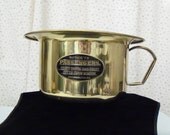

'Necessarily my memory is vague. Great shapes like big machines rose out of the dimness, and cast grotesque black shadows, in which dim spectral Morlocks sheltered from the glare. The place, by the by, was very stuffy and oppressive, and the faint halitus of freshly shed blood was in the air. Some way down the central vista was a little table of white metal, laid with what seemed a meal. The Morlocks at any rate were carnivorous! Even at the time, I remember wondering what large animal could have survived to furnish the red joint I saw. It was all very indistinct: the heavy smell, the big unmeaning shapes, the obscene figures lurking in the shadows, and only waiting for the darkness to come at me again! Then the match burned down, and stung my fingers, and fell, a wriggling red spot in the blackness.




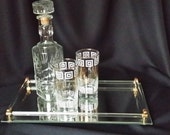

'I wandered during the afternoon along the valley of the Thames, but found nothing that commended itself to my mind as inaccessible. All the buildings and trees seemed easily practicable to such dexterous climbers as the Morlocks, to judge by their wells, must be. Then the tall pinnacles of the Palace of Green Porcelain and the polished gleam of its walls came back to my memory; and in the evening, taking Weena like a child upon my shoulder, I went up the hills towards the south-west. The distance, I had reckoned, was seven or eight miles, but it must have been nearer eighteen. I had first seen the place on a moist afternoon when distances are deceptively diminished. In addition, the heel of one of my shoes was loose, and a nail was working through the sole—they were comfortable old shoes I wore about indoors—so that I was lame. And it was already long past sunset when I came in sight of the palace, silhouetted black against the pale yellow of the sky.






The Time Traveller paused, put his hand into his pocket, and silently placed two withered flowers, not unlike very large white mallows, upon the little table. Then he resumed his narrative.






'As the hush of evening crept over the world and we proceeded over the hill crest towards Wimbledon, Weena grew tired and wanted to return to the house of grey stone. But I pointed out the distant pinnacles of the Palace of Green Porcelain to her, and contrived to make her understand that we were seeking a refuge there from her Fear. You know that great pause that comes upon things before the dusk? Even the breeze stops in the trees. To me there is always an air of expectation about that evening stillness. The sky was clear, remote, and empty save for a few horizontal bars far down in the sunset. Well, that night the expectation took the colour of my fears. In that darkling calm my senses seemed preternaturally sharpened. I fancied I could even feel the hollowness of the ground beneath my feet: could, indeed, almost see through it the Morlocks on their ant-hill going hither and thither and waiting for the dark. In my excitement I fancied that they would receive my invasion of their burrows as a declaration of war. And why had they taken my Time Machine?



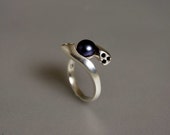
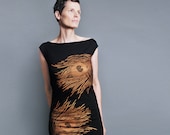

'So we went on in the quiet, and the twilight deepened into night. The clear blue of the distance faded, and one star after another came out. The ground grew dim and the trees black. Weena's fears and her fatigue grew upon her. I took her in my arms and talked to her and caressed her. Then, as the darkness grew deeper, she put her arms round my neck, and, closing her eyes, tightly pressed her face against my shoulder. So we went down a long slope into a valley, and there in the dimness I almost walked into a little river. This I waded, and went up the opposite side of the valley, past a number of sleeping houses, and by a statue—a Faun, or some such figure,minusthe head. Here too were acacias. So far I had seen nothing of the Morlocks, but it was yet early in the night, and the darker hours before the old moon rose were still to come.



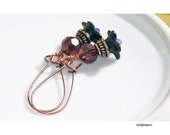
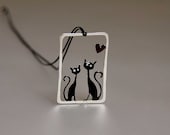

'From the brow of the next hill I saw a thick wood spreading wide and black before me. I hesitated at this. I could see no end to it, either to the right or the left. Feeling tired—my feet, in particular, were very sore—I carefully lowered Weena from my shoulder as I halted, and sat down upon the turf. I could no longer see the Palace of Green Porcelain, and I was in doubt of my direction. I looked into the thickness of the wood and thought of what it might hide. Under that dense tangle of branches one would be out of sight of the stars. Even were there no other lurking danger—a danger I did not care to let my imagination loose upon—there would still be all the roots to stumble over and the tree-boles to strike against.




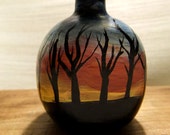

'Weena, I was glad to find, was fast asleep. I carefully wrapped her in my jacket, and sat down beside her to wait for the moonrise. The hill-side was quiet and deserted, but from the black of the wood there came now and then a stir of living things. Above me shone the stars, for the night was very clear. I felt a certain sense of friendly comfort in their twinkling. All the old constellations had gone from the sky, however: that slow movement which is imperceptible in a hundred human lifetimes, had long since rearranged them in unfamiliar groupings. But the Milky Way, it seemed to me, was still the same tattered streamer of star-dust as of yore. Southward (as I judged it) was a very bright red star that was new to me; it was even more splendid than our own green Sirius. And amid all these scintillating points of light one bright planet shone kindly and steadily like the face of an old friend.




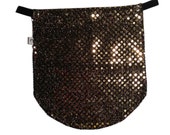

'Looking at these stars suddenly dwarfed my own troubles and all the gravities of terrestrial life. I thought of their unfathomable distance, and the slow inevitable drift of their movements out of the unknown past into the unknown future. I thought of the great precessional cycle that the pole of the earth describes. Only forty times had that silent revolution occurred during all the years that I had traversed. And during these few revolutions all the activity, all the traditions, the complex organizations, the nations, languages, literatures, aspirations, even the mere memory of Man as I knew him, had been swept out of existence. Instead were these frail creatures who had forgotten their high ancestry, and the white Things of which I went in terror. Then I thought of the Great Fear that was between the two species, and for the first time, with a sudden shiver, came the clear knowledge of what the meat I had seen might be. Yet it was too horrible! I looked at little Weena sleeping beside me, her face white and starlike under the stars, and forthwith dismissed the thought.






'Through that long night I held my mind off the Morlocks as well as I could, and whiled away the time by trying to fancy I could find signs of the old constellations in the new confusion. The sky kept very clear, except for a hazy cloud or so. No doubt I dozed at times. Then, as my vigil wore on, came a faintness in the eastward sky, like the reflection of some colourless fire, and the old moon rose, thin and peaked and white. And close behind, and overtaking it, and overflowing it, the dawn came, pale at first, and then growing pink and warm. No Morlocks had approached us. Indeed, I had seen none upon the hill that night. And in the confidence of renewed day it almost seemed to me that my fear had been unreasonable. I stood up and found my foot with the loose heel swollen at the ankle and painful under the heel; so I sat down again, took off my shoes, and flung them away.






'I awakened Weena, and we went down into the wood, now green and pleasant instead of black and forbidding. We found some fruit wherewith to break our fast. We soon met others of the dainty ones, laughing and dancing in the sunlight as though there was no such thing in nature as the night. And then I thought once more of the meat that I had seen. I felt assured now of what it was, and from the bottom of my heart I pitied this last feeble rill from the great flood of humanity. Clearly, at some time in the Long-Ago of human decay the Morlocks' food had run short. Possibly they had lived on rats and such-like vermin. Even now man is far less discriminating and exclusive in his food than he was—far less than any monkey. His prejudice against human flesh is no deep-seated instinct. And so these inhuman sons of men——! I tried to look at the thing in a scientific spirit. After all, they were less human and more remote than our cannibal ancestors of three or four thousand years ago. And the intelligence that would have made this state of things a torment had gone. Why should I trouble myself? These Eloi were mere fatted cattle, which the ant-like Morlocks preserved and preyed upon—probably saw to the breeding of. And there was Weena dancing at my side!



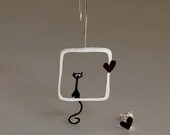
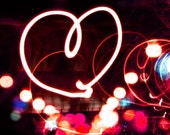

'I had at that time very vague ideas as to the course I should pursue. My first was to secure some safe place of refuge, and to make myself such arms of metal or stone as I could contrive. That necessity was immediate. In the next place, I hoped to procure some means of fire, so that I should have the weapon of a torch at hand, for nothing, I knew, would be more efficient against these Morlocks. Then I wanted to arrange some contrivance to break open the doors of bronze under the White Sphinx. I had in mind a battering ram. I had a persuasion that if I could enter those doors and carry a blaze of light before me I should discover the Time Machine and escape. I could not imagine the Morlocks were strong enough to move it far away. Weena I had resolved to bring with me to our own time. And turning such schemes over in my mind I pursued our way towards the building which my fancy had chosen as our dwelling.






'I found the Palace of Green Porcelain, when we approached it about noon, deserted and falling into ruin. Only ragged vestiges of glass remained in its windows, and great sheets of the green facing had fallen away from the corroded metallic framework. It lay very high upon a turfy down, and looking north-eastward before I entered it, I was surprised to see a large estuary, or even creek, where I judged Wandsworth and Battersea must once have been. I thought then—though I never followed up the thought—of what might have happened, or might be happening, to the living things in the sea.






'To judge from the size of the place, this Palace of Green Porcelain had a great deal more in it than a Gallery of Palaeontology; possibly historical galleries; it might be, even a library! To me, at least in my present circumstances, these would be vastly more interesting than this spectacle of oldtime geology in decay. Exploring, I found another short gallery running transversely to the first. This appeared to be devoted to minerals, and the sight of a block of sulphur set my mind running on gunpowder. But I could find no saltpeter; indeed, no nitrates of any kind. Doubtless they had deliquesced ages ago. Yet the sulphur hung in my mind, and set up a train of thinking. As for the rest of the contents of that gallery, though on the whole they were the best preserved of all I saw, I had little interest. I am no specialist in mineralogy, and I went on down a very ruinous aisle running parallel to the first hall I had entered. Apparently this section had been devoted to natural history, but everything had long since passed out of recognition. A few shrivelled and blackened vestiges of what had once been stuffed animals, desiccated mummies in jars that had once held spirit, a brown dust of departed plants: that was all! I was sorry for that, because I should have been glad to trace the patent readjustments by which the conquest of animated nature had been attained. Then we came to a gallery of simply colossal proportions, but singularly ill-lit, the floor of it running downward at a slight angle from the end at which I entered. At intervals white globes hung from the ceiling—many of them cracked and smashed—which suggested that originally the place had been artificially lit. Here I was more in my element, for rising on either side of me were the huge bulks of big machines, all greatly corroded and many broken down, but some still fairly complete. You know I have a certain weakness for mechanism, and I was inclined to linger among these; the more so as for the most part they had the interest of puzzles, and I could make only the vaguest guesses at what they were for. I fancied that if I could solve their puzzles I should find myself in possession of powers that might be of use against the Morlocks.






'We emerged from the palace while the sun was still in part above the horizon. I was determined to reach the White Sphinx early the next morning, and ere the dusk I purposed pushing through the woods that had stopped me on the previous journey. My plan was to go as far as possible that night, and then, building a fire, to sleep in the protection of its glare. Accordingly, as we went along I gathered any sticks or dried grass I saw, and presently had my arms full of such litter. Thus loaded, our progress was slower than I had anticipated, and besides Weena was tired. And I began to suffer from sleepiness too; so that it was full night before we reached the wood. Upon the shrubby hill of its edge Weena would have stopped, fearing the darkness before us; but a singular sense of impending calamity, that should indeed have served me as a warning, drove me onward. I had been without sleep for a night and two days, and I was feverish and irritable. I felt sleep coming upon me, and the Morlocks with it.






'While we hesitated, among the black bushes behind us, and dim against their blackness, I saw three crouching figures. There was scrub and long grass all about us, and I did not feel safe from their insidious approach. The forest, I calculated, was rather less than a mile across. If we could get through it to the bare hill-side, there, as it seemed to me, was an altogether safer resting-place; I thought that with my matches and my camphor I could contrive to keep my path illuminated through the woods. Yet it was evident that if I was to flourish matches with my hands I should have to abandon my firewood; so, rather reluctantly, I put it down. And then it came into my head that I would amaze our friends behind by lighting it. I was to discover the atrocious folly of this proceeding, but it came to my mind as an ingenious move for covering our retreat.






'I don't know if you have ever thought what a rare thing flame must be in the absence of man and in a temperate climate. The sun's heat is rarely strong enough to burn, even when it is focused by dewdrops, as is sometimes the case in more tropical districts. Lightning may blast and blacken, but it rarely gives rise to widespread fire. Decaying vegetation may occasionally smoulder with the heat of its fermentation, but this rarely results in flame. In this decadence, too, the art of fire-making had been forgotten on the earth. The red tongues that went licking up my heap of wood were an altogether new and strange thing to Weena.



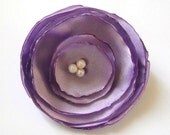
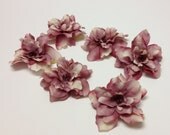

'She wanted to run to it and play with it. I believe she would have cast herself into it had I not restrained her. But I caught her up, and in spite of her struggles, plunged boldly before me into the wood. For a little way the glare of my fire lit the path. Looking back presently, I could see, through the crowded stems, that from my heap of sticks the blaze had spread to some bushes adjacent, and a curved line of fire was creeping up the grass of the hill. I laughed at that, and turned again to the dark trees before me. It was very black, and Weena clung to me convulsively, but there was still, as my eyes grew accustomed to the darkness, sufficient light for me to avoid the stems. Overhead it was simply black, except where a gap of remote blue sky shone down upon us here and there. I struck none of my matches because I had no hand free. Upon my left arm I carried my little one, in my right hand I had my iron bar.






'It was time for a match. But to get one I must put her down. I did so, and, as I fumbled with my pocket, a struggle began in the darkness about my knees, perfectly silent on her part and with the same peculiar cooing sounds from the Morlocks. Soft little hands, too, were creeping over my coat and back, touching even my neck. Then the match scratched and fizzed. I held it flaring, and saw the white backs of the Morlocks in flight amid the trees. I hastily took a lump of camphor from my pocket, and prepared to light it as soon as the match should wane. Then I looked at Weena. She was lying clutching my feet and quite motionless, with her face to the ground. With a sudden fright I stooped to her. She seemed scarcely to breathe. I lit the block of camphor and flung it to the ground, and as it split and flared up and drove back the Morlocks and the shadows, I knelt down and lifted her. The wood behind seemed full of the stir and murmur of a great company!






'She seemed to have fainted. I put her carefully upon my shoulder and rose to push on, and then there came a horrible realization. In manoeuvring with my matches and Weena, I had turned myself about several times, and now I had not the faintest idea in what direction lay my path. For all I knew, I might be facing back towards the Palace of Green Porcelain. I found myself in a cold sweat. I had to think rapidly what to do. I determined to build a fire and encamp where we were. I put Weena, still motionless, down upon a turfy bole, and very hastily, as my first lump of camphor waned, I began collecting sticks and leaves. Here and there out of the darkness round me the Morlocks' eyes shone like carbuncles.



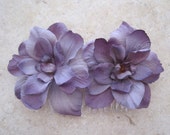
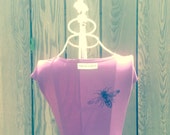

'The camphor flickered and went out. I lit a match, and as I did so, two white forms that had been approaching Weena dashed hastily away. One was so blinded by the light that he came straight for me, and I felt his bones grind under the blow of my fist. He gave a whoop of dismay, staggered a little way, and fell down. I lit another piece of camphor, and went on gathering my bonfire. Presently I noticed how dry was some of the foliage above me, for since my arrival on the Time Machine, a matter of a week, no rain had fallen. So, instead of casting about among the trees for fallen twigs, I began leaping up and dragging down branches. Very soon I had a choking smoky fire of green wood and dry sticks, and could economize my camphor. Then I turned to where Weena lay beside my iron mace. I tried what I could to revive her, but she lay like one dead. I could not even satisfy myself whether or not she breathed.






'Now, the smoke of the fire beat over towards me, and it must have made me heavy of a sudden. Moreover, the vapour of camphor was in the air. My fire would not need replenishing for an hour or so. I felt very weary after my exertion, and sat down. The wood, too, was full of a slumbrous murmur that I did not understand. I seemed just to nod and open my eyes. But all was dark, and the Morlocks had their hands upon me. Flinging off their clinging fingers I hastily felt in my pocket for the match-box, and—it had gone! Then they gripped and closed with me again. In a moment I knew what had happened. I had slept, and my fire had gone out, and the bitterness of death came over my soul. The forest seemed full of the smell of burning wood. I was caught by the neck, by the hair, by the arms, and pulled down. It was indescribably horrible in the darkness to feel all these soft creatures heaped upon me. I felt as if I was in a monstrous spider's web. I was overpowered, and went down. I felt little teeth nipping at my neck. I rolled over, and as I did so my hand came against my iron lever. It gave me strength. I struggled up, shaking the human rats from me, and, holding the bar short, I thrust where I judged their faces might be. I could feel the succulent giving of flesh and bone under my blows, and for a moment I was free.






'The strange exultation that so often seems to accompany hard fighting came upon me. I knew that both I and Weena were lost, but I determined to make the Morlocks pay for their meat. I stood with my back to a tree, swinging the iron bar before me. The whole wood was full of the stir and cries of them. A minute passed. Their voices seemed to rise to a higher pitch of excitement, and their movements grew faster. Yet none came within reach. I stood glaring at the blackness. Then suddenly came hope. What if the Morlocks were afraid? And close on the heels of that came a strange thing. The darkness seemed to grow luminous. Very dimly I began to see the Morlocks about me—three battered at my feet—and then I recognized, with incredulous surprise, that the others were running, in an incessant stream, as it seemed, from behind me, and away through the wood in front. And their backs seemed no longer white, but reddish. As I stood agape, I saw a little red spark go drifting across a gap of starlight between the branches, and vanish. And at that I understood the smell of burning wood, the slumbrous murmur that was growing now into a gusty roar, the red glow, and the Morlocks' flight.






'Stepping out from behind my tree and looking back, I saw, through the black pillars of the nearer trees, the flames of the burning forest. It was my first fire coming after me. With that I looked for Weena, but she was gone. The hissing and crackling behind me, the explosive thud as each fresh tree burst into flame, left little time for reflection. My iron bar still gripped, I followed in the Morlocks' path. It was a close race. Once the flames crept forward so swiftly on my right as I ran that I was outflanked and had to strike off to the left. But at last I emerged upon a small open space, and as I did so, a Morlock came blundering towards me, and past me, and went on straight into the fire!






'And now I was to see the most weird and horrible thing, I think, of all that I beheld in that future age. This whole space was as bright as day with the reflection of the fire. In the centre was a hillock or tumulus, surmounted by a scorched hawthorn. Beyond this was another arm of the burning forest, with yellow tongues already writhing from it, completely encircling the space with a fence of fire. Upon the hill-side were some thirty or forty Morlocks, dazzled by the light and heat, and blundering hither and thither against each other in their bewilderment. At first I did not realize their blindness, and struck furiously at them with my bar, in a frenzy of fear, as they approached me, killing one and crippling several more. But when I had watched the gestures of one of them groping under the hawthorn against the red sky, and heard their moans, I was assured of their absolute helplessness and misery in the glare, and I struck no more of them.



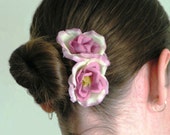


'At last I sat down on the summit of the hillock, and watched this strange incredible company of blind things groping to and fro, and making uncanny noises to each other, as the glare of the fire beat on them. The coiling uprush of smoke streamed across the sky, and through the rare tatters of that red canopy, remote as though they belonged to another universe, shone the little stars. Two or three Morlocks came blundering into me, and I drove them off with blows of my fists, trembling as I did so.






'For the most part of that night I was persuaded it was a nightmare. I bit myself and screamed in a passionate desire to awake. I beat the ground with my hands, and got up and sat down again, and wandered here and there, and again sat down. Then I would fall to rubbing my eyes and calling upon God to let me awake. Thrice I saw Morlocks put their heads down in a kind of agony and rush into the flames. But, at last, above the subsiding red of the fire, above the streaming masses of black smoke and the whitening and blackening tree stumps, and the diminishing numbers of these dim creatures, came the white light of the day.






'I searched again for traces of Weena, but there were none. It was plain that they had left her poor little body in the forest. I cannot describe how it relieved me to think that it had escaped the awful fate to which it seemed destined. As I thought of that, I was almost moved to begin a massacre of the helpless abominations about me, but I contained myself. The hillock, as I have said, was a kind of island in the forest. From its summit I could now make out through a haze of smoke the Palace of Green Porcelain, and from that I could get my bearings for the White Sphinx. And so, leaving the remnant of these damned souls still going hither and thither and moaning, as the day grew clearer, I tied some grass about my feet and limped on across smoking ashes and among black stems, that still pulsated internally with fire, towards the hiding-place of the Time Machine. I walked slowly, for I was almost exhausted, as well as lame, and I felt the intensest wretchedness for the horrible death of little Weena. It seemed an overwhelming calamity. Now, in this old familiar room, it is more like the sorrow of a dream than an actual loss. But that morning it left me absolutely lonely again—terribly alone. I began to think of this house of mine, of this fireside, of some of you, and with such thoughts came a longing that was pain.






'But as I walked over the smoking ashes under the bright morning sky, I made a discovery. In my trouser pocket were still some loose matches. The box must have leaked before it was lost.



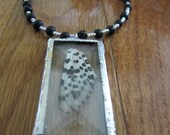
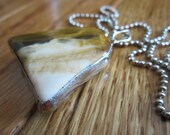

'About eight or nine in the morning I came to the same seat of yellow metal from which I had viewed the world upon the evening of my arrival. I thought of my hasty conclusions upon that evening and could not refrain from laughing bitterly at my confidence. Here was the same beautiful scene, the same abundant foliage, the same splendid palaces and magnificent ruins, the same silver river running between its fertile banks. The gay robes of the beautiful people moved hither and thither among the trees. Some were bathing in exactly the place where I had saved Weena, and that suddenly gave me a keen stab of pain. And like blots upon the landscape rose the cupolas above the ways to the Under-world. I understood now what all the beauty of the Over-world people covered. Very pleasant was their day, as pleasant as the day of the cattle in the field. Like the cattle, they knew of no enemies and provided against no needs. And their end was the same.




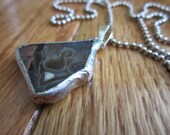

'I awoke a little before sunsetting. I now felt safe against being caught napping by the Morlocks, and, stretching myself, I came on down the hill towards the White Sphinx. I had my crowbar in one hand, and the other hand played with the matches in my pocket.




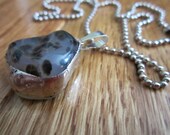

'Within was a small apartment, and on a raised place in the corner of this was the Time Machine. I had the small levers in my pocket. So here, after all my elaborate preparations for the siege of the White Sphinx, was a meek surrender. I threw my iron bar away, almost sorry not to use it.






'You may imagine how all my calm vanished. The little brutes were close upon me. One touched me. I made a sweeping blow in the dark at them with the levers, and began to scramble into the saddle of the machine. Then came one hand upon me and then another. Then I had simply to fight against their persistent fingers for my levers, and at the same time feel for the studs over which these fitted. One, indeed, they almost got away from me. As it slipped from my hand, I had to butt in the dark with my head—I could hear the Morlock's skull ring—to recover it. It was a nearer thing than the fight in the forest, I think, this last scramble.



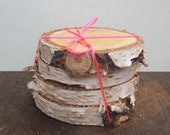
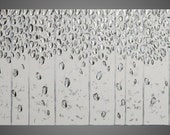

'As I drove on, a peculiar change crept over the appearance of things. The palpitating greyness grew darker; then—though I was still travelling with prodigious velocity—the blinking succession of day and night, which was usually indicative of a slower pace, returned, and grew more and more marked. This puzzled me very much at first. The alternations of night and day grew slower and slower, and so did the passage of the sun across the sky, until they seemed to stretch through centuries. At last a steady twilight brooded over the earth, a twilight only broken now and then when a comet glared across the darkling sky. The band of light that had indicated the sun had long since disappeared; for the sun had ceased to set—it simply rose and fell in the west, and grew ever broader and more red. All trace of the moon had vanished. The circling of the stars, growing slower and slower, had given place to creeping points of light. At last, some time before I stopped, the sun, red and very large, halted motionless upon the horizon, a vast dome glowing with a dull heat, and now and then suffering a momentary extinction. At one time it had for a little while glowed more brilliantly again, but it speedily reverted to its sullen red heat. I perceived by this slowing down of its rising and setting that the work of the tidal drag was done. The earth had come to rest with one face to the sun, even as in our own time the moon faces the earth. Very cautiously, for I remembered my former headlong fall, I began to reverse my motion. Slower and slower went the circling hands until the thousands one seemed motionless and the daily one was no longer a mere mist upon its scale. Still slower, until the dim outlines of a desolate beach grew visible.



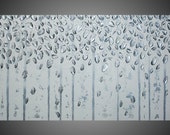
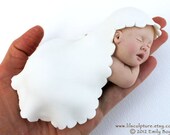

'I stopped very gently and sat upon the Time Machine, looking round. The sky was no longer blue. North-eastward it was inky black, and out of the blackness shone brightly and steadily the pale white stars. Overhead it was a deep Indian red and starless, and south-eastward it grew brighter to a glowing scarlet where, cut by the horizon, lay the huge hull of the sun, red and motionless. The rocks about me were of a harsh reddish colour, and all the trace of life that I could see at first was the intensely green vegetation that covered every projecting point on their south-eastern face. It was the same rich green that one sees on forest moss or on the lichen in caves: plants which like these grow in a perpetual twilight.



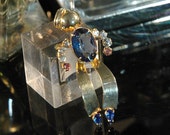
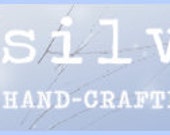

'The machine was standing on a sloping beach. The sea stretched away to the south-west, to rise into a sharp bright horizon against the wan sky. There were no breakers and no waves, for not a breath of wind was stirring. Only a slight oily swell rose and fell like a gentle breathing, and showed that the eternal sea was still moving and living. And along the margin where the water sometimes broke was a thick incrustation of salt—pink under the lurid sky. There was a sense of oppression in my head, and I noticed that I was breathing very fast. The sensation reminded me of my only experience of mountaineering, and from that I judged the air to be more rarefied than it is now.



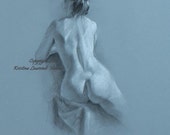
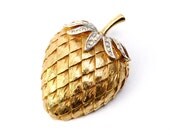

'Far away up the desolate slope I heard a harsh scream, and saw a thing like a huge white butterfly go slanting and fluttering up into the sky and, circling, disappear over some low hillocks beyond. The sound of its voice was so dismal that I shivered and seated myself more firmly upon the machine. Looking round me again, I saw that, quite near, what I had taken to be a reddish mass of rock was moving slowly towards me. Then I saw the thing was really a monstrous crab-like creature. Can you imagine a crab as large as yonder table, with its many legs moving slowly and uncertainly, its big claws swaying, its long antennae, like carters' whips, waving and feeling, and its stalked eyes gleaming at you on either side of its metallic front? Its back was corrugated and ornamented with ungainly bosses, and a greenish incrustation blotched it here and there. I could see the many palps of its complicated mouth flickering and feeling as it moved.



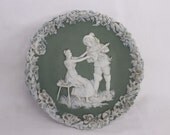
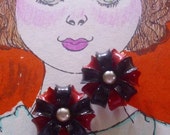

'As I stared at this sinister apparition crawling towards me, I felt a tickling on my cheek as though a fly had lighted there. I tried to brush it away with my hand, but in a moment it returned, and almost immediately came another by my ear. I struck at this, and caught something threadlike. It was drawn swiftly out of my hand. With a frightful qualm, I turned, and I saw that I had grasped the antenna of another monster crab that stood just behind me. Its evil eyes were wriggling on their stalks, its mouth was all alive with appetite, and its vast ungainly claws, smeared with an algal slime, were descending upon me. In a moment my hand was on the lever, and I had placed a month between myself and these monsters. But I was still on the same beach, and I saw them distinctly now as soon as I stopped. Dozens of them seemed to be crawling here and there, in the sombre light, among the foliated sheets of intense green.



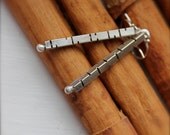
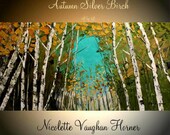

'I cannot convey the sense of abominable desolation that hung over the world. The red eastern sky, the northward blackness, the salt Dead Sea, the stony beach crawling with these foul, slow-stirring monsters, the uniform poisonous-looking green of the lichenous plants, the thin air that hurts one's lungs: all contributed to an appalling effect. I moved on a hundred years, and there was the same red sun—a little larger, a little duller—the same dying sea, the same chill air, and the same crowd of earthy crustacea creeping in and out among the green weed and the red rocks. And in the westward sky, I saw a curved pale line like a vast new moon.




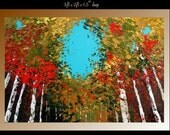

'So I travelled, stopping ever and again, in great strides of a thousand years or more, drawn on by the mystery of the earth's fate, watching with a strange fascination the sun grow larger and duller in the westward sky, and the life of the old earth ebb away. At last, more than thirty million years hence, the huge red-hot dome of the sun had come to obscure nearly a tenth part of the darkling heavens. Then I stopped once more, for the crawling multitude of crabs had disappeared, and the red beach, save for its livid green liverworts and lichens, seemed lifeless. And now it was flecked with white. A bitter cold assailed me. Rare white flakes ever and again came eddying down. To the north-eastward, the glare of snow lay under the starlight of the sable sky and I could see an undulating crest of hillocks pinkish white. There were fringes of ice along the sea margin, with drifting masses further out; but the main expanse of that salt ocean, all bloody under the eternal sunset, was still unfrozen.




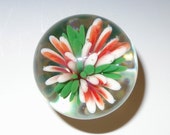

'I looked about me to see if any traces of animal life remained. A certain indefinable apprehension still kept me in the saddle of the machine. But I saw nothing moving, in earth or sky or sea. The green slime on the rocks alone testified that life was not extinct. A shallow sandbank had appeared in the sea and the water had receded from the beach. I fancied I saw some black object flopping about upon this bank, but it became motionless as I looked at it, and I judged that my eye had been deceived, and that the black object was merely a rock. The stars in the sky were intensely bright and seemed to me to twinkle very little.



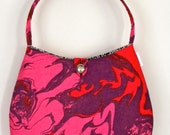


'The darkness grew apace; a cold wind began to blow in freshening gusts from the east, and the showering white flakes in the air increased in number. From the edge of the sea came a ripple and whisper. Beyond these lifeless sounds the world was silent. Silent? It would be hard to convey the stillness of it. All the sounds of man, the bleating of sheep, the cries of birds, the hum of insects, the stir that makes the background of our lives—all that was over. As the darkness thickened, the eddying flakes grew more abundant, dancing before my eyes; and the cold of the air more intense. At last, one by one, swiftly, one after the other, the white peaks of the distant hills vanished into blackness. The breeze rose to a moaning wind. I saw the black central shadow of the eclipse sweeping towards me. In another moment the pale stars alone were visible. All else was rayless obscurity. The sky was absolutely black.



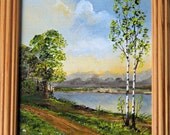


'A horror of this great darkness came on me. The cold, that smote to my marrow, and the pain I felt in breathing, overcame me. I shivered, and a deadly nausea seized me. Then like a red-hot bow in the sky appeared the edge of the sun. I got off the machine to recover myself. I felt giddy and incapable of facing the return journey. As I stood sick and confused I saw again the moving thing upon the shoal—there was no mistake now that it was a moving thing—against the red water of the sea. It was a round thing, the size of a football perhaps, or, it may be, bigger, and tentacles trailed down from it; it seemed black against the weltering blood-red water, and it was hopping fitfully about. Then I felt I was fainting. But a terrible dread of lying helpless in that remote and awful twilight sustained me while I clambered upon the saddle.






'So I came back. For a long time I must have been insensible upon the machine. The blinking succession of the days and nights was resumed, the sun got golden again, the sky blue. I breathed with greater freedom. The fluctuating contours of the land ebbed and flowed. The hands spun backward upon the dials. At last I saw again the dim shadows of houses, the evidences of decadent humanity. These, too, changed and passed, and others came. Presently, when the million dial was at zero, I slackened speed. I began to recognize our own pretty and familiar architecture, the thousands hand ran back to the starting-point, the night and day flapped slower and slower. Then the old walls of the laboratory came round me. Very gently, now, I slowed the mechanism down.






'And yet, not exactly! The thing had started from the south-east corner of the laboratory. It had come to rest again in the north-west, against the wall where you saw it. That gives you the exact distance from my little lawn to the pedestal of the White Sphinx, into which the Morlocks had carried my machine.






His eye fell with a mute inquiry upon the withered white flowers upon the little table. Then he turned over the hand holding his pipe, and I saw he was looking at some half-healed scars on his knuckles.



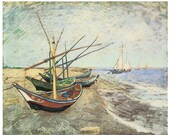


He caught up the lamp swiftly, and carried it, flaring red, through the door into the corridor. We followed him. There in the flickering light of the lamp was the machine sure enough, squat, ugly, and askew; a thing of brass, ebony, ivory, and translucent glimmering quartz. Solid to the touch—for I put out my hand and felt the rail of it—and with brown spots and smears upon the ivory, and bits of grass and moss upon the lower parts, and one rail bent awry.




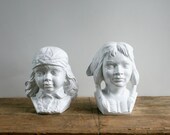

As I took hold of the handle of the door I heard an exclamation, oddly truncated at the end, and a click and a thud. A gust of air whirled round me as I opened the door, and from within came the sound of broken glass falling on the floor. The Time Traveller was not there. I seemed to see a ghostly, indistinct figure sitting in a whirling mass of black and brass for a moment—a figure so transparent that the bench behind with its sheets of drawings was absolutely distinct; but this phantasm vanished as I rubbed my eyes. The Time Machine had gone. Save for a subsiding stir of dust, the further end of the laboratory was empty. A pane of the skylight had, apparently, just been blown in.



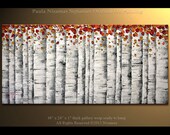


One cannot choose but wonder. Will he ever return? It may be that he swept back into the past, and fell among the blood-drinking, hairy savages of the Age of Unpolished Stone; into the abysses of the Cretaceous Sea; or among the grotesque saurians, the huge reptilian brutes of the Jurassic times. He may even now—if I may use the phrase—be wandering on some plesiosaurus-haunted Oolitic coral reef, or beside the lonely saline lakes of the Triassic Age. Or did he go forward, into one of the nearer ages, in which men are still men, but with the riddles of our own time answered and its wearisome problems solved? Into the manhood of the race: for I, for my own part, cannot think that these latter days of weak experiment, fragmentary theory, and mutual discord are indeed man's culminating time! I say, for my own part. He, I know—for the question had been discussed among us long before the Time Machine was made—thought but cheerlessly of the Advancement of Mankind, and saw in the growing pile of civilization only a foolish heaping that must inevitably fall back upon and destroy its makers in the end. If that is so, it remains for us to live as though it were not so. But to me the future is still black and blank—is a vast ignorance, lit at a few casual places by the memory of his story. And I have by me, for my comfort, two strange white flowers—shrivelled now, and brown and flat and brittle—to witness that even when mind and strength had gone, gratitude and a mutual tenderness still lived on in the heart of man.



